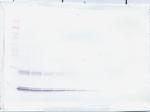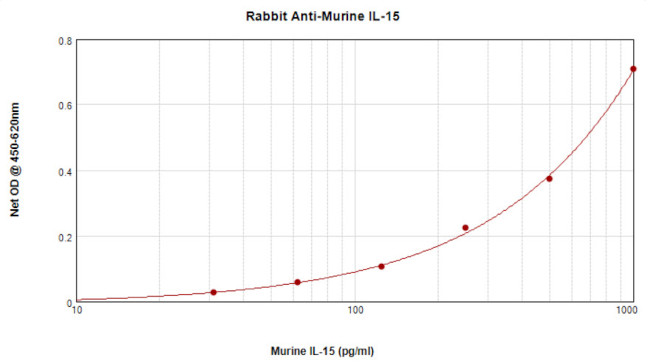Search Thermo Fisher Scientific
FIGURE: 1 / 3
IL-15 Antibody (500-P173-1MG) in ELISA



Product Details
500-P173-1MG
Species Reactivity
Published species
Host/Isotype
Class
Type
Immunogen
Conjugate
Form
Concentration
Purification
Storage buffer
Contains
Storage conditions
Shipping conditions
RRID
Product Specific Information
AA Sequence of recombinant protein: MNWIDVRYDL EKIESLIQSI HIDTTLYTDS DFHPSCKVTA MNCFLLELQV ILHEYSNMTL NETVRNVLYL ANSTLSSNKN VAESGCKECE ELEEKTFTEF LQSFIRIVQM FINTS.
Preparation: Produced from sera of rabbits immunized with highly pure Recombinant Murine IL-15. Anti-Murine IL-15-specific antibody was purified by affinity chromatography employing an immobilized Murine IL-15 matrix.
Sandwich ELISA: To detect Murine IL-15 by sandwich ELISA (using 100 µL/well antibody solution) a concentration of 0.5-2.0 µg/mL of this antibody is required. This antigen affinity purified antibody, in conjunction with PeproTech Biotinylated Anti-Murine IL-15 (500-P173Bt) as a detection antibody, allows the detection of at least 0.2-0.4 ng/well of Recombinant Murine IL-15.
Western Blot: To detect Murine IL-15 by Western Blot analysis this antibody can be used at a concentration of 0.1-0.2 µg/mL. Used in conjunction with compatible secondary reagents the detection limit for Recombinant Murine IL-15 is 1.5-3.0 ng/lane, under either reducing or non-reducing conditions.
Target Information
IL-15 (Interleukin 15 ) is a cytokine that regulates T and natural killer cell activation and proliferation. IL-15 and IL-2 share many biological activities as both have been found to bind common hematopoietin receptor subunits, and may compete for the same receptor, and thus negatively regulate each other's activity. The number of CD8+ memory cells is shown to be controlled by a balance between IL-15 and IL-2. IL-15 induces the activation of JAK kinases, as well as the phosphorylation and activation of transcription activators STAT3, STAT5, and STAT6. In mouse, studies suggest that IL-15 may increase the expression of apoptosis inhibitor Bcl-xL, possibly through the transcription activation activity of STAT6, and thus prevent apoptosis. IL-15 plays an important role in the growth and differentiation of T and B lymphocytes, natural killer cells, macrophages, and monocytes as well as activation of a number of important intracellular signaling molecules. As such, IL-15 could be essential for the immune responses, allograft rejection, and the pathogenesis of autoimmune diseases. Further, IL-15 is a widely expressed pro-inflammatory cytokine and has been shown to play a role in several inflammatory disorders, including rheumatoid arthritis, psoriasis and pulmonary inflammatory diseases. Emerging data suggest that IL-15 may serve as a good therapeutic target, as there appears to be a beneficial effect of IL-15 neutralization in models of psoriasis and diabetes.
For Research Use Only. Not for use in diagnostic procedures. Not for resale without express authorization.
Bioinformatics
Protein Aliases: il 15; IL-15; ILN; Interleukin; Interleukin-15; Interleukin15; M-IL-15; MGC9721
Gene Aliases: AI503618; IL-15; Il15
UniProt ID: (Mouse) P48346
Entrez Gene ID: (Mouse) 16168

Performance Guarantee
If an Invitrogen™ antibody doesn't perform as described on our website or datasheet,we'll replace the product at no cost to you, or provide you with a credit for a future purchase.*
Learn more
We're here to help
Get expert recommendations for common problems or connect directly with an on staff expert for technical assistance related to applications, equipment and general product use.
Contact tech support
